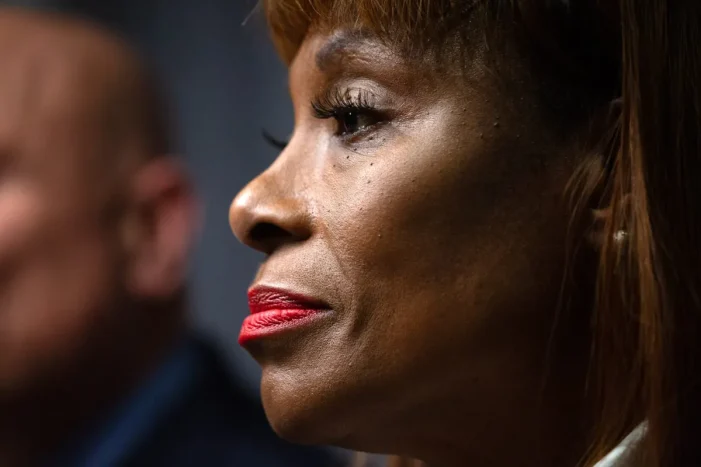By
A court hearing Tuesday made clear that the Manhattan District Attorney’s investigation of Mayor Eric Adams’ former top aide Ingrid Lewis-Martin encompasses far more than the bribery and money laundering charges she’s facing.
A large quantity of phone and text communications prosecutors obtained prior to the December indictment of Lewis-Martin and her accused co-conspirators relates to ongoing investigations that have yet to result in charges, prosecutors revealed Tuesday.
Lewis-Martin, a longtime associate of Adams and his chief advisor, resigned in December, four days before her indictment was unsealed by Manhattan DA Alvin Bragg. Prosecutors charged Lewis-Martin with arranging $100,000 in payments for her son, Glenn Martin II, from two builders in exchange for pressuring city buildings inspectors to back off objections to their developments. All four pleaded not guilty and denied wrongdoing.
Lewis-Martin’s association with Adams goes back more than a decade to his time in the state Senate, continuing through his tenure as Brooklyn borough president and culminating with her appointment to the number two spot at City Hall. It’s widely known that Lewis-Martin has long been Adams’ closest advisor and confidante.
Adams faces his own troubles with a pending federal indictment on bribery and campaign finance fraud charges. President Trump has criticized the prosecution of Adams, and implied because the case is federal – unlike Lewis-Martin’s – he could pardon him. Adams has pleaded not guilty and denied wrongdoing.
In September Lewis-Martin received a subpoena from Manhattan federal prosecutors and her phones were seized by the DA when she arrived at JFK International Airport, returning from a Japan vacation with Jesse Hamilton, an Adams’ associate the mayor tasked with handling city leases, and Diana Boutross, a broker for Cushman & Wakefield who works with the city on those real estate deals. Hamilton and Boutross’ phones were also confiscated by the DA.
Lewis-Martin also surfaced in the DA’s 2023 indictment of Adams’ former building commissioner, Eric Ulrich, although she was not charged. Prosecutors highlighted her interactions with a Brooklyn tow truck firm owner prosecutors say was bribing Ulrich for assistance in obtaining favorable treatment from City Hall. Ulrich and his co-defendants all pleaded not guilty and their cases are pending.
The existence of an ongoing broader investigation emerged during a virtual court hearing before Manhattan Supreme Court Justice Daniel Conviser when defense attorneys complained that the DA, as required, turned over reams of evidence — including phone conversations and texts. In this case, that included material that went well beyond the charges in the December indictment. The DA imposed a restriction barring them from showing this material or even discussing it with their clients – a limitation defense attorneys contested Tuesday.
Assistant District Attorney Guy Tardanico argued that Lewis-Martin, Glenn Martin II, and the two contractors should not be allowed to see the material about ongoing investigations because the information could wind up being shared with others under investigation.
“They’re proposing that we disclose material related to targets of pending investigations,” he said, noting that the material prosecutors have already turned over is “very specific to ongoing matters — specific to ongoing investigations.”
Prosecutors often impose “attorneys’ eyes-only” restrictions on evidence they turn over to defense attorneys in criminal cases over concerns that the clients could use the material to either warn associates under investigation or to target informants.
Kathleen Cassidy, attorney for one of the indicted builders Raizada Vaid, said that concern could easily be addressed if they all agree that their clients would be explicitly prohibited from sharing the information with anyone, “preventing them from telling other targets of the investigation.”
And Michael Cibella, attorney for Martin (also known by his DJ name Suave Luciano), argued that letting the lawyers at least discuss the other material with their clients “allows us to speak with our clients about the breadth of this investigation.”
Lewis-Martin’s attorney, Arthur Aidala, who has in the past represented accused members of organized crime, acknowledged that prosecutors can have a legitimate reason for keeping certain information — such as the identities of cooperating witnesses — from criminal defendants. In this case, however, he considered such fears to be unreasonable.
“Yeah we have organized crime cases where someone’s going to get their head blown off,” he said, “but I’m very confident that’s not the position here.”
Judge Conviser ordered the DA to spell out in writing by next week specifically what material should remain “attorneys’ eyes only” and what material the lawyers could discuss with their clients.

